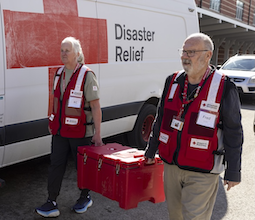Wunmi Bakare's commanding presence as a global public relations executive and founder of WBPR Agency only captures a glimpse of an extraordinary journey that transcends boardrooms and borders. Diagnosed with sickle cell disease at 18 months old in Nigeria, where the condition often carries deep social stigma, she has transformed her personal struggles into a platform for revolutionary change that is reshaping how the world views and treats this challenging illness.
"There is more to patient advocacy than just raising awareness," Bakare often reminds her audiences—a truth her own story exemplifies. From undergoing major surgeries at age seven to participating in a groundbreaking clinical trial at the National Heart, Lung and Blood Institute in 2019, her path has been marked by both daunting challenges and remarkable triumphs. Following a successful stem cell transplant, she has emerged as one of the rare disease community's most powerful voices.
Today, as creator of #SickleCellProdigy and co-host of the #ThroughtheGenes Podcast, Bakare's influence extends from boardrooms to global platforms. Her commitment transcends awareness—she is actively reshaping policies, mobilizing resources, and dismantling stigmas. In this candid Q&A, the American Red Cross explores the heart and mind of a fierce activist who is not simply changing the narrative around sickle cell disease—she is redefining the future of global patient advocacy.
Red Cross: Your impact spans transforming patient care to leading a global PR agency. What's a day in the life of Wunmi Bakare – how do you typically start your day?
Wunmi Bakare: A typical day for me starts as early as 6 a.m. with prayers and low-impact yoga, as surrendering to God and strengthening my core helps me better manage stress. After taking my morning pills, I scroll through emails and list out action items for the day. Unlike most advocates in the sickle cell space, I work as a full-time publicist, juggling meetings, overseeing brand partnerships, and scheduling press interviews. I spend the latter part of my morning on Google Trends, taking stock of the latest stories and insights on sickle cell disease. Then I prepare for media planning and content strategy meetings.
Red Cross: You've mastered the art of balancing advocacy and leadership. What is one thing you do every day that keeps you centered?
Wunmi Bakare: I recite my rosary every morning, as it sets the tone for the day. I always ask God to speak through me and use me as a vessel for His work.
Red Cross: Do you have a special mantra?
Wunmi Bakare: "Forget regret, or life is yours to miss." – From the Broadway musical, "RENT"
Red Cross: You've been a powerful voice in changing the narrative around sickle cell disease. What do you wish more people knew about the disease?
Wunmi Bakare: I wish more people understood the profound impact sickle cell disease has on both physical and emotional well-being. Many people are unaware that sickle cell disease isn't just about occasional pain crises; it's a chronic condition that affects every aspect of life. The pain from vaso-occlusive crises can be excruciating and persistent, and managing it often involves navigating complex medical and emotional challenges.
I also wish people knew about the psychological toll of living with a chronic illness. The stigma associated with sickle cell disease can lead to significant emotional distress, affecting how individuals are perceived and treated by others. This stigma further exacerbates the sense of isolation and misunderstanding that many people with sickle cell experience.
Red Cross: Your advocacy has inspired countless others in the sickle cell community. Who or what has been your biggest source of inspiration
Wunmi Bakare: My biggest source of inspiration is the resilience and strength of individuals who face chronic illness and adversity with courage and determination. People who navigate the daily challenges of conditions like sickle cell disease while advocating for better understanding and treatment embody a remarkable spirit of perseverance. Their ability to turn personal struggles into a source of motivation—for themselves and others—is profoundly inspiring.
Red Cross: You've turned challenges into triumphs throughout your journey. What's something that pushes your limits but brings you joy?
Wunmi Bakare: One thing that challenges me but brings me joy is maintaining a regular exercise routine. Engaging in physical activity requires significant effort and discipline, especially while managing chronic pain. Despite these challenges, I find great joy in the sense of accomplishment and well-being that comes from staying active. Exercise helps improve my mood, manage stress, and maintain overall health, making the effort worthwhile even when it's tough.
Red Cross: Which favorite artists are on your music playlist?
Wunmi Bakare: Ayra Starr, Sam Smith, Asake, Gyakie, Sabrina Carpenter, BTS, Tanner Adell, and Rihanna.
Red Cross: You’re still managing sickle cell-related complications like iron overload and avascular necrosis while also adjusting to life on the other side of sickle cell disease. How do you stay positive?
Wunmi Bakare: Regularly reflecting on what I'm thankful for helps shift my focus from difficulties to the positive aspects of my life. This can be as simple as appreciating small joys or acknowledging personal achievements. My faith in God is also how I stay resilient and positive, as He has carried me through all the challenges I've faced with this debilitating blood disease.
Red Cross: Your story has so many inspiring chapters. What is the most surprising thing about you?
Wunmi Bakare: The most surprising thing about me is that I am proudly Nigerian. I may be from a developing country, but I am fiercely proud of where I come from. It's also interesting how I find strength and joy in unexpected places, despite facing significant challenges. For instance, despite dealing with chronic pain and health complications, I maintain a deep appreciation for life's small moments and actively seek out sources of joy and inspiration.
Red Cross: You're transforming both healthcare advocacy and global communications. As you continue breaking barriers and building bridges, what do you most want to be known for?
Wunmi Bakare: I want to be known for my passion, kindness, grit, and my ability to turn challenges into opportunities for growth and positive impact.
Red Cross: What drives your advocacy for sickle cell?
Wunmi Bakare: My advocacy for sickle cell disease is deeply driven by my extensive and diverse experiences with healthcare systems around the world. Having received medical care in six different countries—Nigeria, Ghana, Côte d'Ivoire, the United Kingdom, Canada and the United States—I've gained a comprehensive understanding of various treatment protocols and healthcare practices. This global perspective allows me to appreciate the nuances and disparities in sickle cell care across different regions.
Combining my multicultural background, personal experience with sickle cell disease, research involvement and participation in clinical trials, I offer a unique and invaluable perspective. My experiences have equipped me with a deep understanding of the healthcare ecosystem and the specific needs of the sickle cell community. This drives my commitment to advocate for better care, support and education globally.
Red Cross: You’ve received over 60 blood transfusions throughout your journey. What would you tell someone who is on the fence about donating blood?
Wunmi Bakare: Donating blood is a simple yet profoundly impactful way to help others in need. One donation can save multiple lives. Blood is crucial for surgeries, trauma care and treating various medical conditions, including those with chronic illnesses like sickle cell disease. Your donation could be the difference between life and death for someone in critical need.
Joined by Blood
Blood and platelet donations are vital in supporting patients with sickle disease undergoing gene therapies, stem cell transplants as well as those in need of regular blood transfusions to alleviate pain and help manage their disease.
A patient undergoing cell or gene-based therapies for sickle cell disease may need as many as 50 units of blood and up to 25 units of platelets. Schedule a blood donation appointment today by visiting RedCrossBlood.org using the Blood Donor App or calling 1-800-RED-CROSS (1-800-733-2767).
Blood Donor Eligibility
A blood donor card or driver’s license or two other forms of identification are required at check-in. Individuals who are 17 years of age in most states (16 with parental consent where allowed by state law), weigh at least 110 pounds and are in generally good health may be eligible to donate blood. High school students and other donors 18 years of age and younger also must meet certain height and weight requirements.
Blood and platelet donors can save time at their next donation by using RapidPass® to complete their pre-donation reading and health history questionnaire online, on the day of their donation, before arriving at the blood drive. To get started, follow the instructions at RedCrossBlood.org/RapidPass or use the Blood Donor App.
Come give blood in October for a $10 Amazon.com Gift Card by email. Plus, automatically be entered for a chance to win a $5,000 gift card, there will be three lucky winners! Terms apply: rcblood.org/treat.












